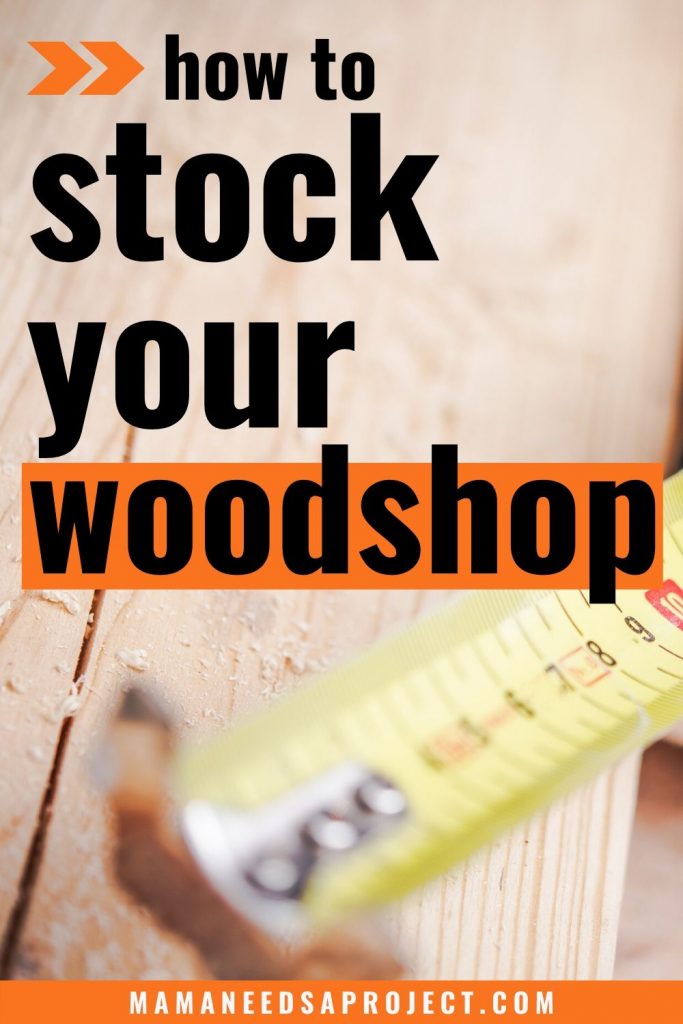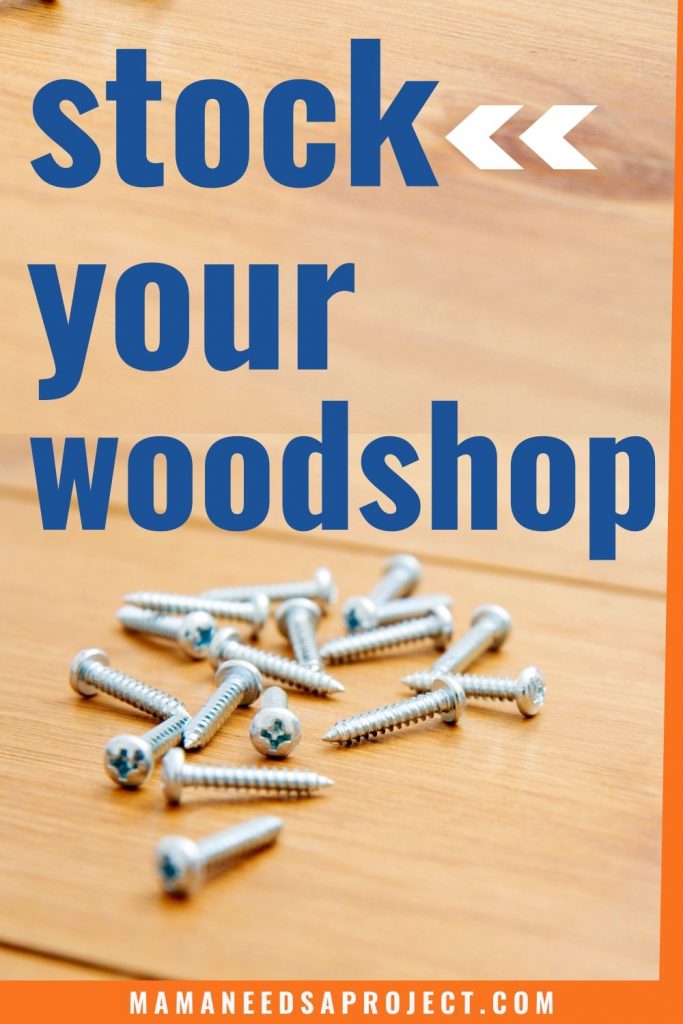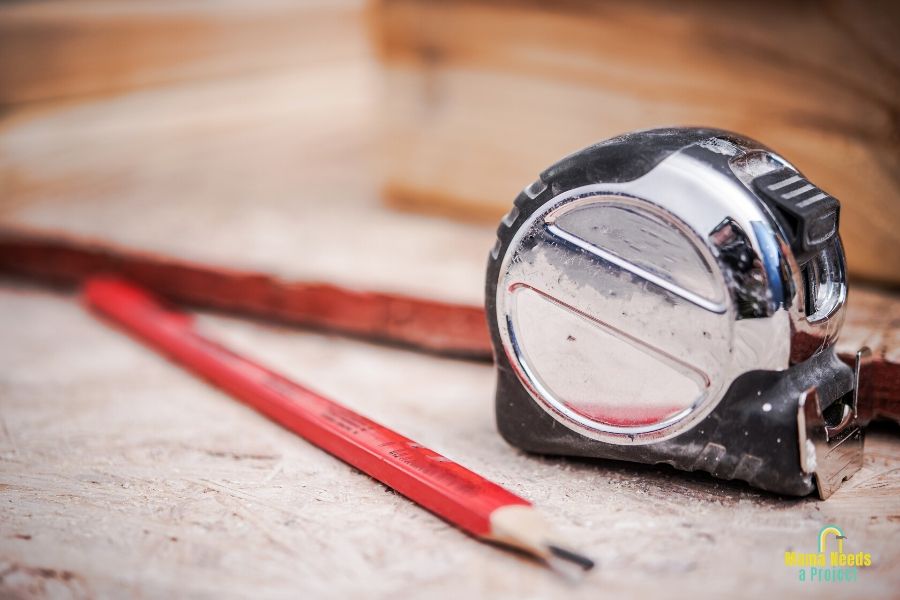Items to Always Stock in Your Woodshop (that aren’t tools and lumber)
There are lots of lists of the big tools you need to build up your woodworking shop (like this one), but what about the little, everyday stuff?
Over my years of woodworking I’ve learned that there are a few items that I will ALWAYS need, regardless of what project I’m working on.
I try to keep my woodshop pretty organized and am conscious about how much I keep on hand.
(Because my “woodshop” is really just a cramped garage.)
This is a list of items that I insist on keeping around and stocking up on despite my small space.
They are essential to every one of my projects and I know they’ll be useful in your shop, too.

Stock your Woodshop
Wood Glue
I use wood glue on every single one of my projects. Glue gives you a much stronger hold than wood screws alone and is absolutely essential to building pieces that last.
I buy my wood glue by the jug and keep a refillable glue bottle on my bench. I prefer Tightbond III for my glue – it hasn’t let me down yet!
And not long ago I bought this glue bottle, which totally lives up to it’s awesome reviews. It never clogs and I never have to spend time shaking it upside down to try to get the glue to come out.
Extra Drill Bits
While I try to keep my woodshop organized, it still get messy quickly and often. Every time it starts to get messy I lose my Phillips head drill bits. I have spent hours of my life looking around my shop for these drill bits. It’s ridiculous.
So, I fixed the problem by deciding to keep what seems like an unnecessary amount of drill bits in multiple spots around my shop. I keep them on a magnetic bowl on our garage fridge. I hang new packages on my peg board. I keep some on a magnet strip on the wall near the drills. And I keep a few more extras in a drawer on top of my workbench.
There is nothing more frustrating than wasting 30 minutes or more of your shop time searching for something instead of actually building. If you’re like me and always misplace the little stuff I recommend stashing those items around the shop to save yourself some time. The magnetic bowl on the fridge has been particularly helpful.
Sandpaper
As much as I hate sanding (I really, really hate it), it’s unavoidable for most projects. I keep the grits of sandpaper I normally use on hand in a small shelf on my workbench. I usually have sheets of 60, 100, 150, 200 and 220 grit sandpaper stocked in my shop.
If you use sanders that require specialty paper – like orbital sanders, mouse sanders or belt sanders – I recommend keeping a stock of that paper on hand, too. It’s usually cheaper to buy in bulk and you know you’re going to need it at some point.
Equipment Instruction Manuals
Yes, I keep all of my equipment manuals. And I really do refer to them on occasion. In fact not long ago I had to pull out my table saw manual to figure out how to do partial depth cuts for this project.
The manuals come in handy when you can’t figure out how to use a certain function of your equipment or when you’re trying to troubleshoot an issue.
If you’ve already disposed of or lost your equipment manual, don’t worry, most of them can be found online by just Googling the brand and model number of your machinery. I just like having the paper copies on hand to quickly refer to when I need them.
Extension Cords
Most of my tools are corded so extension cords are a must. Especially since I make up for my small shop space by doing most of my woodworking in the driveway.
I installed a hook like this one directly into the wall near an electrical outlet to hang extension cords on. It keeps them tidy, easy to access and I always know where they are.
Mineral Spirits
I keep a jug of mineral spirits on hand to help me clean up paint brushes and paint spills, especially when I’m using oil-based paint or stain.
I also recently used mineral spirits to clean up brushes and surfaces after using Citistrip to strip paint from a bed frame I refinished. I was shocked at how well the mineral spirits cleaned everything up.
Paint Can Openers
Those little paint can openers are another thing that I am constantly misplacing. I have started keeping a stash of them in a few places in my woodshop so I know that I can always find them.
I keep a few hanging on my peg board and another one on a magnetic dish on my garage refrigerator.
It’s a tiny tool that you will be reaching for every time you need to open a can of paint or stain so I recommend having a few around.
Of course you can always open the cans with a flat screwdriver, but I am notorious for bending up can lids beyond use trying to open them that way.
Related: Is Woodworking Profitable?
Wood Screws
I usually buy my wood screws in bulk because I know that I will need them for nearly all of my projects.
You will save money by buying screws in larger packages in bulk rather than buying small packages for each project. Plus you’ll hopefully save yourself from the frustrating experience of being almost done with a project just to run out of screws.
The sizes you need to keep on hand will depend on the types of wood you generally work with. Currently I have a big stock of 1-1/4″, 2″, 2-1/2″ and 3″ long screws because these are what I use most often.

5 Less Obvious Things to Stock in Your Woodshop
1. Pencils & Pencil Sharpener
So technically this is two things, but they go hand-in-hand. I use a pencil to mark out measurements on my boards, take notes and plan my project. I use regular pencils (not mechanical) because mechanical pencils are a bit too sharp and tend to indent the wood when I’m using a soft wood like pine. A regular, kind of dull #2 pencil is easy to write quick measurements with and sand off when I’m done.
2. Paper
I write a lot of my own building plans and also like to take notes as I’m building so a notebook is a must. I just use a regular lined notebook, but grid-style paper is handy, too.
3. Rags
Wiping off sawdust, applying stain, cleaning up my workbench or the inevitable, occasional splash of paint – I’m constantly using rags while working on projects. You can buy a bag of pre-cut rags at most home improvements stores, but I have a stash of old shirts and towels that I keep just for this purpose.
4. Paper Towels
I tend to go overboard with my wood glue application pretty much every time. I always keep a roll of regular paper towels or shop towels on hand for quick glue removal and clean up.
5. Calculator
When I first started woodworking I had no idea that there would be so much math involved – and fractions! I am constantly going to my calculator to double check my plans.
Best Brands
Wondering what the best brands of tools are?
Check out this guide to see if Kobalt is a good brand!
And a few extra things that I always keep stocked in my woodshop
- Cheap Foam Brushes – great for applying glue
- Rubber gloves – to protect my hands when applying stain or painting
- Little handheld broom & dust pan – for cleaning sawdust off projects, my workbench and tools
- Stir sticks – for mixing up paint and wood stain, I usually make my own out of scrap wood
- Small Tupperware Containers – I use these for mixing up paint colors, washing out brushes and holding screws or other small pieces while I’m working
Stock Your Woodshop beyond Tools and Lumber
I hope this list is helpful to you! I often get questions about what items to keep on hand in a hobby woodshop and these are the items that I always stock up and use on nearly every single project.
If you have anything to add to the list, please leave it in the comments below!

